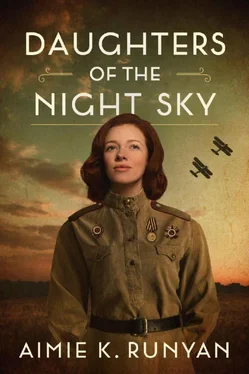“We’re too low!” I bellowed, unnecessarily loud, given the interphone.
“Mark it anyway!” she called back, matching my volume.
I could see a munitions tent in good range, and given what I could see—not very much—it was the best target we could hope to hit.
“Three… two… one… mark! ” The cold metal of the flare felt caustic, like acid, against my warm skin as I removed the cap and tossed it over the side of the plane to illuminate the target for Taisiya. I ripped the little white parachute from the flare, caring more about the speed of its descent than pinpoint accuracy.
Taisiya dropped the bomb over the munitions tent, hitting her mark without a centimeter of error. I swallowed my congratulations for the excellent run when the plane bounced upward with the force of the blast. We’d never bombed from such a low elevation, and it seemed like the regulations were in place for a good reason.
“I think we’re going to be fine,” Taisiya said, anticipating my question. “We’re climbing fine, and she seems to be responding as well as she ever does.”
“Let’s get back as fast as she’ll haul us, then,” I said, wondering what damage might have been done that we couldn’t tell from our rudimentary equipment.
Taisiya gave me a wave. “Have some grenades at the ready in case we get company.”
She needn’t have reminded me. Retreat was often the most dangerous part of the mission. Most times we arrived unnoticed, and it wasn’t until we were on our way back to base that the Germans were in the air and able to return fire. The best they could do until then was shoot at us from the ground, which was plenty dangerous. They would only have a short window to chase us before they got close enough to Russian airspace that their mission would become suicide. The Germans weren’t ones for taking needless risks without benefit, and one of our little planes wasn’t worth losing one of theirs.
But there was a window to attack us, and they were getting better at using it. They knew to blind us with their searchlights. It made them more visible but kept us from being able to aim or escape with accuracy. We had begun to use planes as decoys to divert the Germans’ attention while two others swooped in to drop their payloads, but the risk to the decoy plane was enormous.
My hunched shoulders lowered only as the welcome shape of our aerodrome became visible by light of flares waved by the ground crews. This time no enemy craft pursued us, perhaps owing to the proximity of their camp to ours. Unless they launched a large portion of their fleet for a proper counterattack, it would be too risky to fly so close to our base, which they knew was well awake and prepared to shoot down anyone who got too close.
We landed, and a dozen people, Renata and Polina in particular, dashed toward us. My hands, steady in the craft, trembled now that my feet were back on solid earth.
“We thought you’d gone down. The clouds were thick as soup!” Nika, a pilot, cried out. “We all turned back!”
“What kept you?” Sofia asked, silencing the clamor with the ring of authority. “The visibility was too low. You should have turned back.”
“By the time we’d reached the abort level, we’d been engaged by an enemy spotlight,” Taisiya answered, the relief of being back on solid ground now replaced with sobriety and discipline. Her answers to these questions mattered a great deal, as would mine. “There was no making a stealthy getaway, so I ordered Lieutenant Soloneva to mark the target, and I dropped our payload. She questioned dropping the bomb at such a low altitude, but in the end she followed my orders.”
She was taking responsibility for the damage to the plane, as any decent pilot would, but I had to speak in her defense. “Despite the adverse conditions, Lieutenant Pashkova made the target and destroyed a large stockpile of munitions. It had to be a significant blow to that camp’s ability to advance on us. She delivered us back safely.”
“With a great deal of luck, it would seem,” Sofia said. Her eyes weren’t on Taisiya or me, but on the aircraft behind us. The canvas on the underbelly was badly scorched and had to have been within seconds of erupting into flames.
A meter or two lower and we wouldn’t have survived the blast.
Sorties: 165
An hour after dawn we were all assembled before the general, whose ruddy face was now a terrifying shade of purple as he spoke to the regiment.
“I expected you to be undisciplined. Girls aren’t raised to understand the need for rule and order in the same manner that boys are. But I didn’t expect you to be stupid and careless. Worse, dishonest.” General Chernov paced back and forth in front of us as we stood at attention in precise rows.
Our reckless flight was the tipping point, but there were myriad misdemeanors that had driven the general to take action. The parachutes on the flares, sometimes useful, but dead inconvenient if there was a wind any stronger than a light breeze, were frequently discarded. Not being the wasteful sort, some of the girls who were handy with a needle had taken to fashioning the discarded nylon into proper ladies’ undergarments. We used our red navigators’ pencils in place of lipstick when there was none to be had. Little things to remind us of who we were. I was guiltier of these petty crimes than most—I’d been the one to turn our navigation pencils to lipstick, after all—but couldn’t feel remorse for my misdeeds.
“You misuse army property, you disobey automatic abort levels that are put in place for the safety of valuable aircraft”—I held back a snort at this… the fifteen-year-old, ramshackle planes were worth the army’s concern, but not our lives?—“you take your one holiday as an excuse to overindulge to the point that you are unfit for service. If it were up to me, I’d send you all home to your mothers this very afternoon. I’d reserve space on much-needed trains and send you as fast as I could arrange for it and get you out of my hair.” The general’s bald head under the harsh incandescent lights glowed like the moon. More than a few of us had to stifle derisive chuckles. “But it seems that Comrade Stalin cannot be persuaded of your uselessness.”
He glared in Sofia’s direction, a wordless accusation in his gaze. He blamed Sofia for Stalin’s commitment to our regiment, probably for motives that were not entirely innocent. Of course no woman could have influence over a man if there wasn’t a shared impropriety binding them. I knew Stalin’s admiration for Sofia was born solely from her accomplishments in aviation, but that wouldn’t stop the other officers from making their own—incorrect—assumptions about how Sofia had gained her influence. I felt the grinding of enamel as my molars grated against each other while he continued his tirade.
“I have court-martialed two of you this morning for the most flagrant displays of misuse of army property. Lieutenants Mateeva and Borzliova have been sentenced to ten years’ hard labor in Siberia.” I held my tongue, knowing that Chernov would not tolerate an outburst, but there were quiet titters from some without the same military training, for Svetlana and Nika were still with us, though their red eyes and dour expressions revealed their difficult morning. Chernov’s eyes narrowed, but he went on.
“But I have decided, in the greater interests of the motherland, to commute their sentences to serving in this regiment for the duration of the war, provided they perform their duties with no further incident. They will serve their sentence once we are victorious. I trust that from this moment forward they will serve as models of good behavior and military discipline for the lot of you. Let this be a warning to you girls. Further antics of this sort will not be tolerated.”
Читать дальше












